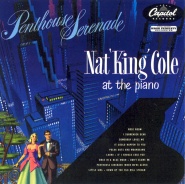A Pile o' Cole's Nat King Cole Website
Site Menu
Penthouse Serenade
Recorded July 18th 1952 and July 14th 1955
Nat Cole - piano, arranger
John Collins - guitar
Charlie Harris - bass
Lee Young - drums
Jack Constanzo - bongos (tracks 2 & 8)
Lee Gillette - producer
Capitol H-332 (10") EBF-332 (EP) T-332 (12")
- Penthouse Serenade (When We're Alone)
- Somebody Loves Me
- Laura
- Once In A Blue Moon
- Polka Dots And Moonbeams
- Down By The Old Mill Stream
- If I Should Lose You
- Rose Room
- I Surrender Dear
- It Could Happen To You
- Don't Blame Me
- Little Girl
"The whole package, from the cover to the last note, is a tangible dream of its 'cocktail piano' era and fairly radiates the era's ideal of sophistication."
Cocktails for two, please, James. In this elegant set of jazz instrumentals, the KC3 tries their deft hands at after-hours cocktail lounge piano. 'Easy listening' it is, but 'easy' definitely doesn't translate to the top-shelf level of musicianship, execution or musical quality of the set. Every bit as deft and dazzling as it is elegant, this album was Nat's first original album for the new long-play vinyl format, first as a 10" LP in 1952 and subsequently expanded to a 12" LP in 1955 with the addition of tracks of the exact same qualities. It features Nat on piano with his trio-mates in support only, so this is usually considered to be a solo Nat King Cole recording, rather than a Trio recording.
Laura features what turned out to be the longest recorded stretch of Nat playing entirely solo piano. As the solo intro comes in at a mere 40 seconds, this seems incredible, but it's true. Like the rest of the set, it's beautiful work. If anything, the '55 tracks show Nat in even finer form. It Could Happen To You is the track I'd have to single out as the highlight.
As far as sales went, the future prospects for the Trio was limited and fading due to shifts in fashions, while the future for pop vocal balladry looked to be better and infinite. Capitol might well have conceived of this set in order to establish a more lucrative market for his piano talents: upscale ambience, with perhaps a foot in the then-growing straight jazz market. Alas, sales were such one might joke that Penthouse Serenade only sold to owners of ritzy metropolitan penthouses. This point is of course not exactly unrelated to why there would be less heard from Nat's piano and more pop vocals in future.
But the passage of time has done more to Penthouse Serenade than make the marketing concepts irrelevant and the fashions out of date. Perhaps it isn't a likely candidate for a couple's ambient music anymore. But, if only when we're alone, we might discover some appeal remains to this record. The whole package, from the cover to the last note, is a tangible dream of its 'cocktail piano' era and fairly radiates the era's ideal of sophistication. On the tasty, swinging side of the somewhat imaginary polite rarified society it was intended for. To us, today, it offers something akin to the appeal of escapist fantasy. And there is the musicianship, offering today what it did in '52 and '55. It is our pleasure.
